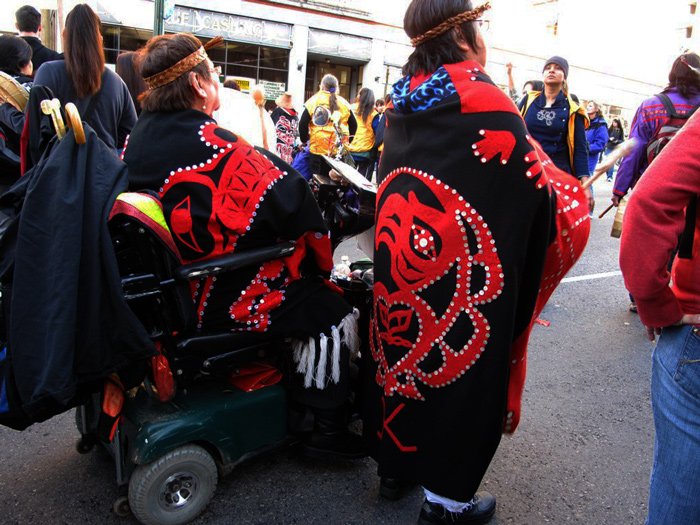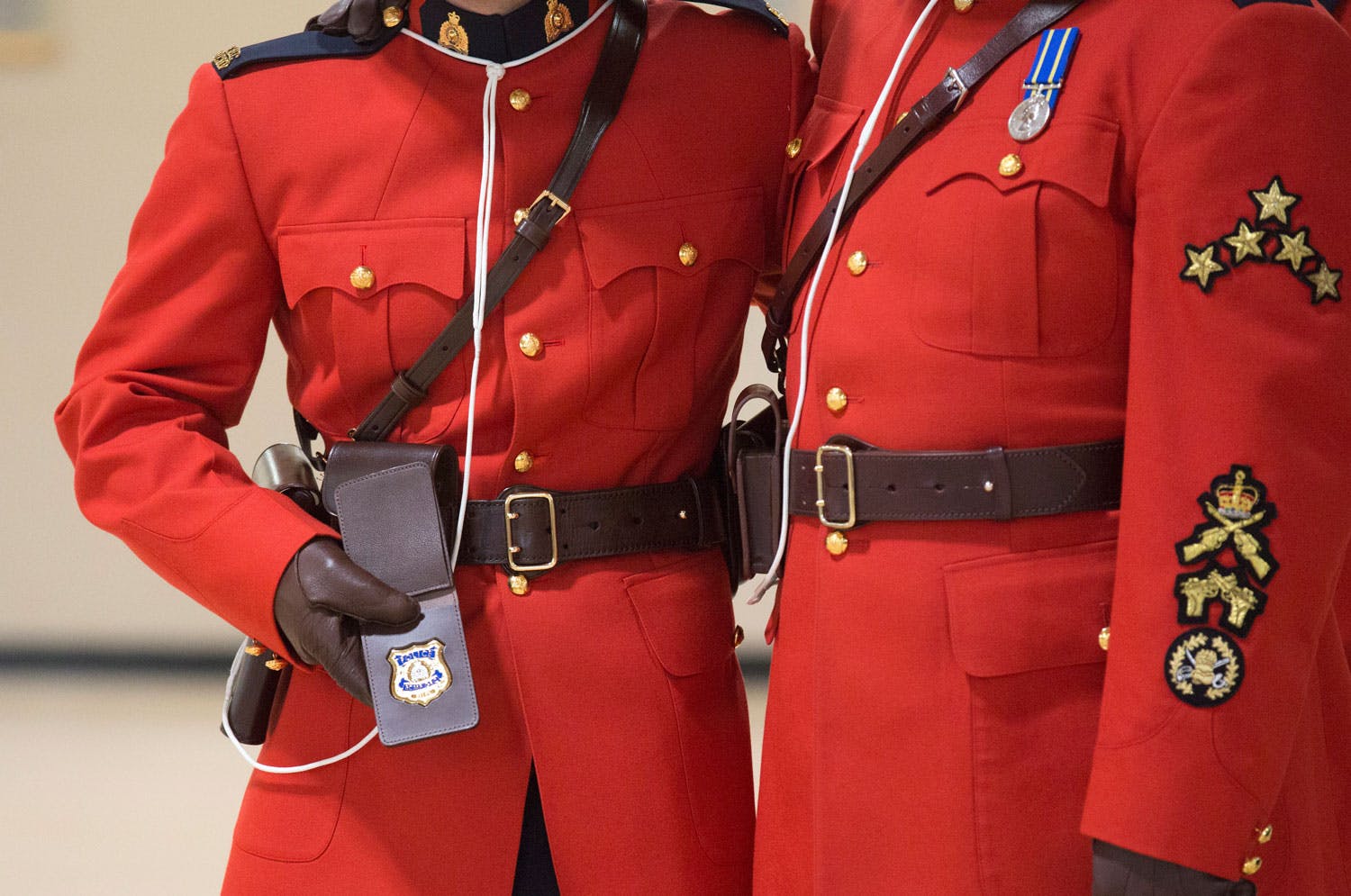Meanwhile in Canada, Cops Still Cause Harm
Forget the memes: Canadian police hurt Black and Indigenous people just as much as their colleagues to the south.
The author’s boyfriend always knew he would wear the red serge RCMP uniform, and she knew she was going to stand by his side.
I met my first love when I was 15. On our first date, I went over to his house to do math homework and watch American Idol. He gave me my first awkward-but-mind-blowing kiss while the sound of someone butchering “I Will Always Love You” played in the background. It was perfect.
My family quickly became his family, and his became mine. We were both Métis, both with two Métis parents, and I often daydreamed in class about having his Métis babies. His mom ran a daycare at the Grand Council, and his dad was a high-ranking RCMP sergeant. For as far back as he could remember, my boyfriend knew he was going to be a cop, just like his dad. His hero. And I was going to stand by his side.
At the time, it didn’t occur to me that there was anything complicated about my boyfriend being both Métis and an aspiring cop. In fairness to myself, I was young, and this was in the Before Times. Before this Black Mirror episode that has been the 2020s so far, with police violence against people of colour representing the “other pandemic.”
Before demonstrations across the US and around the world were sparked by the murders of George Floyd and Breonna Taylor—and, more recently, Jason Walker, Herman Whitfield III, and Latoya James—at the hands of armed officers with too much institutional power and not enough (any?) anti-racism and racial-bias training. Before citizens more urgently called for violent cops to be arrested, the state to be held accountable, and the police to be defunded. Before the movements that have become the hashtags of our lives: #BlackLivesMatter, #MeToo, and #ACAB—All Cops Are Bastards.
I guess, with my teenage sensibilities, my views were more in line with social media users who have bought into misguided “Meanwhile in Canada” memes, which juxtapose photos of rioting and looting with a moose eating someone’s garden lilies, or a beaver waddling through a Tim Hortons, or a Mountie visiting a child’s roadside lemonade stand. Images of Canadian exceptionalism. This meme papers over the fact that our “heroes” in the red serge were established by our first prime minister as a way of asserting control over Indigenous land and Indigenous people. And that these “heroes” are still, to this day, holding fast to their institutional colonial power.
It didn’t occur to me that there was anything complicated about my boyfriend being both Métis and an aspiring cop.
After our first year of university, my boyfriend was accepted into an RCMP Indigenous Pre-Cadet Training Program aimed at recruiting Indigenous youth between the ages of 19 and 29. He attended a three-week training camp at headquarters in Regina, then spent the summer working as a real police officer, with a partner and a cop car and a uniform. He took a photo next to his dad at the closing ceremony after the program finished, both in their police garb, beaming. Proud of each other and proud of themselves for the great service they’d both done, under the umbrella of an organization that claimed to value them.
As a white-coded cis woman in my teens and early twenties, my only worry about marrying a future cop was that he’d be hurt in the line of duty. I was excited by the idea of a cop’s salary, of him being able to support me while I tried to make it as a writer. And when I saw his mom—who was so proud of the work her husband did, the way he protected his community—I couldn’t help but look forward to the day I, too, would project that pride onto the man I loved.
In the summer of 2015, my cousin went missing outside our hometown of Prince Albert, SK. For 12 days, her aunties and uncles and siblings searched for her on quads and on foot. The media response was dismal, even after her body was discovered. Two days later, at a small vigil held where she was found, my grandma found blood, an earring, a tooth. No forensic team, no yellow tape. It came as no surprise that the RCMP didn’t have answers for the family: They hadn’t even taken the time to do a proper clean-up.

In the summer of 2015, the author’s cousin went missing, becoming one of the thousands of Indigenous women and girls who have gone missing or been murdered in Canada. This crisis has been highlighted for 32 years at the Women’s Memorial March in Vancouver’s Downtown Eastside, pictured above.
My “RCMP wife” fantasy was brought to its knees the day my boyfriend revealed to me that his dad had been assigned to my cousin’s case, and that he’d said he “wished” he could give me details about her murder, but she was part of a larger investigation and the information was “privileged.” My first thought was, If she was white, they wouldn’t be using her death to fry bigger fish. It finally began to dawn on me—and I’m ashamed that it took a personal tragedy for me to come to the realization—how very twisted it was that this lovely Indigenous family, my family, believed so wholly in the “goodness” and “heroism” of an organization that not only didn’t value them, but had been created to destroy them.
And then I began to question my boyfriend’s intentions. Had I ever heard him say, “I want to help people”? No. It was always just, “I want to be like my Dad.” To this day, no one has been charged with my cousin’s murder, even though her community knows who’s responsible.
My boyfriend and I broke up later that summer, after almost six years together. It was for different reasons at the time, reasons that left me feeling broken, but I recognized a tiny feeling stirring underneath the anguish: relief. I no longer had to be a cop’s wife.
We need to denounce the idea that #ACAB means “I hate your loved one.” It really means: the system is and has always been harmful.
I don’t mean to conflate anti-Black racism with anti-Indigenous racism: they are not the same. They have unique histories and require individual anti-racism efforts. But they do, unfortunately, share a scaffolding in police oppression. Many people—and not just white people!—are, I think, having a difficult time reconciling the images of police inflicting violence on racialized people with the image of the Career Day dad passing his badge around the classroom. Or the cop in your own family who you share a bucket of chicken with every Sunday, who has been your confidante and protector, who you want to be when you grow up.
But, collectively, we need to denounce the idea that #ACAB means “I hate your loved one.” It really means: the system is and has always been harmful. It means: anyone who works within the system is upholding white supremacy. It means: dismantle the system, because it’s built on top of the bodies of Black and brown people, and let the kin they left behind guide our way forward.
My ex and his family are good people, some of the best people I’ve ever known. I love them, and still consider them to be my family. And because I love them, I hope they’ll end up on the right side of history here. #ACAB.
Print Issue: Summer/Fall 2022
Print Title: Meanwhile In Canada
